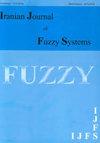一种双边模糊支持向量机混合高斯混合模型
IF 1.2
4区 数学
Q1 MATHEMATICS
引用次数: 1
摘要
模糊支持向量机是处理分类问题中不确定性的一种特殊方法。隶属函数是对不确定性进行建模的合适方法。隶属函数的目的是根据重要性来区分不同的点。隶属函数的一般设计依赖于观测值到类中心的距离。然而,类中心受到异常值存在的影响。为了防止这种影响,我们在隶属函数结构中使用了一种称为高斯混合模型的无监督学习方法。提出了基于距离和基于贝叶斯两种不同类别的隶属度函数。与经典隶属函数不同,异常值在训练阶段的贡献通过降低其重要程度而降低。将经典模糊支持向量机分类器与高斯混合模型进行杂交,不仅可以提高分类精度,而且可以避免过拟合问题。通过综合和基准数据集评估了所提出方法的优越性。采用非参数Friedman检验和事后Nemenyi检验评估统计显著性。本文章由计算机程序翻译,如有差异,请以英文原文为准。
A bilateral fuzzy support vector machine hybridizing the Gaussian mixture model
The fuzzy support vector machine is one of the most exceptional methods to deal with uncertainty in the classification problem. The membership function is a proper way to model uncertainty. The goal of the membership function is to distinguish the different points in terms of their importance. The ordinary design of the membership function relies on the distance of the observations to the class center. However, the class center is affected by the presence of outliers. To prevent this effect, we utilized an unsupervised learning method called the Gaussian mixture model in the structure of the membership function. The proposed membership function is presented in two different categories distance-based and Bayes-based. Unlike the classical membership function, the contribution of outliers in the training phase decreased by diminishing their degree of importance. Hybridizing the classic fuzzy support vector machine classifier with the Gaussian mixture model will enhance the classification accuracy and also will prevent overfitting problems. The superiority of the proposed methods assessed by the synthetic and benchmarking dataset. The statistical significance is assessed by using the non-parametric Friedman and post-hoc Nemenyi tests.
求助全文
通过发布文献求助,成功后即可免费获取论文全文。
去求助
来源期刊
CiteScore
3.50
自引率
16.70%
发文量
0
期刊介绍:
The two-monthly Iranian Journal of Fuzzy Systems (IJFS) aims to provide an international forum for refereed original research works in the theory and applications of fuzzy sets and systems in the areas of foundations, pure mathematics, artificial intelligence, control, robotics, data analysis, data mining, decision making, finance and management, information systems, operations research, pattern recognition and image processing, soft computing and uncertainty modeling.
Manuscripts submitted to the IJFS must be original unpublished work and should not be in consideration for publication elsewhere.

 求助内容:
求助内容: 应助结果提醒方式:
应助结果提醒方式:


